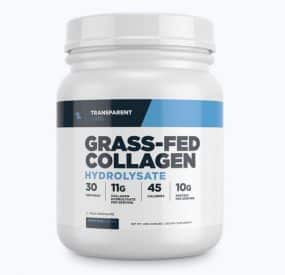Collagen aids weight loss by helping you build muscle and feel more satiated.
Collagen, a natural component of the human body, is widely acclaimed for its benefits to skin and hair. Yet, its role in weight loss has sparked interest and debate. This article delves into the effectiveness and safety of using collagen as a weight loss supplement, scrutinizing the scientific evidence behind it. Continue reading for comprehensive insights.
What Is Collagen?
Collagen is an essential protein that makes up as much as 30% of your body’s proteins. It’s present in all your tissues and organs. Collagen gives structure to the body’s connective tissues, such as the skin, muscles, bones, ligaments, tendons, blood vessels, and cartilage (1).
In its natural form, collagen consists of 19 amino acids wound tightly together, making it strong and stable. Of these three amino acids, proline, glycine, and hydroxyproline comprise almost 60% of collagen. In the human body, fibroblasts make collagen; you need enough proteins and vitamin C.
Collagen supplements are made from the tissues and bones of animals like cows, pigs, fish, or horses. They can be purchased as powders, capsules, gummies, or liquids and packaged in food or drinks.
Forms of Collagen in Supplements
While there are 28 types of collagen, only four are common and are used in supplements. The first is type I, most commonly present in the human body. You’ll also find this form in nails, hair, and skin.
Type II collagen is the form found in your cartilage. This is the best collagen to use for joint health or to tackle symptoms of osteoarthritis (2). Type III collagen has skin-enhancing benefits and can prevent wrinkles.
There are also multi-collagen blends, including a mix of types that give you all their benefits at once. A good example is the Transparent Labs Collagen Hydrolysate, made from bovine collagen rich in type I and III collagen.
Over time, consistent hydrolyzed collagen supplementation can even deliver visible reductions in skin wrinkles and sagging. Recent evidence exists suggesting hydrolyzed collagen may also aid in recovery for athletes, bone structure, and joint health.
Does Collagen Work for Weight Loss?
There’s little research linking collagen directly to weight loss. However, as collagen is a type of protein, numerous experts suggest it could support weight loss. Although many more studies are needed, the following benefits of collagen as a protein could help your weight loss journey.
Proteins & Weight Loss
First, it’s essential to determine how proteins aid weight loss. According to research, proteins increase your satiety and feeling of fullness (3). As a result, you’ll eat less, which could lead to weight loss.
Proteins also increase muscle mass. The body expends more energy with more muscle because muscle burns more calories at rest, leading to an overall increase in total calorie expenditure for the day. Finally, proteins have a higher thermic effect, the highest thermic effect of all the macronutrients. This means your body expends more energy digesting proteins than it would for carbs and fat.
Collagen & Satiety
While collagen is a protein, it’s not an ideal protein source. Firstly, it’s unusually high in three types of amino acids and comparatively low in the other. Also, this double-blind study between whey protein and collagen supplements found that those taking collagen had more weight gain (4). The researchers believe it may be because collagen is missing tryptophan and BCAAs, which are linked to satiety in whey protein. Like all other proteins, collagen can fill us up, which can help reduce hunger pangs.
Collagen & Muscle Growth
As already mentioned, building muscle can lead to weight loss. Collagen is the main structural protein in your muscles, so taking it can increase your muscle mass, leading to weight loss. In this study, participants who took collagen supplements while training had a greater increase in muscle mass than those who did not (5).
Other Ways That Collagen Can Affect Weight
Now, apart from being a protein, there are other ways in which collagen may indirectly lead to weight loss. Below are some of them:
Collagen & Body Fat
Some research has shown that collagen can reduce body fat. In this 2019 study, 81 people who received collagen supplements from fish for 12 weeks significantly lowered their body fat percentage and body fat mass (6).
Collagen & Joint Pain
Collagen may also reduce joint pain, which could lead to weight loss. Joint pain can inhibit your motivation to exercise or even limit your ability to train properly. This study of 15 clinical trials showed that collagen reduced joint pain and improved functionality among the participants (7).
Wrapping Up
Collagen may support weight loss efforts by enhancing feelings of fullness, decreasing body fat, and alleviating joint pain, facilitating more effective training sessions. Nonetheless, it’s not a miraculous solution and should not replace healthy lifestyle choices. Consider incorporating collagen supplements into a comprehensive approach that includes a balanced diet and regular exercise for optimal outcomes.
FAQs
Can collagen help in weight loss?
Because collagen is a protein, it may have some benefits regarding weight loss. It’ll help build muscle to speed up your metabolism and reduce joint discomfort, allowing you to train more. However, more research is needed to link collagen to weight loss directly.
Does collagen have side effects?
Generally, people consider collagen safe, but the FDA doesn’t regulate it, and researchers have not thoroughly investigated its side effects. However, some people report having an unpleasant taste in their mouth, getting heartburn, and feeling full after taking collagen.
What is the best way to lose weight?
You must reduce your calorie intake and increase your daily expenditure to lose weight. This will force your body to use up your fat stores as energy. Supplements like collagen can also aid your weight loss journey.
Follow us on Instagram, Facebook, and Twitter for more supplement tips!
References
- Wu M, Cronin K, Crane JS. Biochemistry, Collagen Synthesis. [Updated 2023 Sep 4]. In: StatPearls [Internet]. Treasure Island (FL): StatPearls Publishing; 2024 Jan-. Available from: https://www.ncbi.nlm.nih.gov/books/NBK507709/
- Kumar, S., Sugihara, F., Suzuki, K., Inoue, N., & Venkateswarathirukumara, S. (2015). A double-blind, placebo-controlled, randomised, clinical study on the effectiveness of collagen peptide on osteoarthritis. Journal of the science of food and agriculture, 95(4), 702–707. https://doi.org/10.1002/jsfa.6752
- Moon, J., & Koh, G. (2020). Clinical Evidence and Mechanisms of High-Protein Diet-Induced Weight Loss. Journal of obesity & metabolic syndrome, 29(3), 166–173. https://doi.org/10.7570/jomes20028
- Giglio, B. M., Schincaglia, R. M., da Silva, A. S., Fazani, I. C. S., Monteiro, P. A., Mota, J. F., Cunha, J. P., Pichard, C., & Pimentel, G. D. (2019). Whey Protein Supplementation Compared to Collagen Increases Blood Nesfatin Concentrations and Decreases Android Fat in Overweight Women: A Randomized Double-Blind Study. Nutrients, 11(9), 2051. https://doi.org/10.3390/nu11092051
- Zdzieblik, D., Oesser, S., Baumstark, M. W., Gollhofer, A., & König, D. (2015). Collagen peptide supplementation in combination with resistance training improves body composition and increases muscle strength in elderly sarcopenic men: a randomised controlled trial. The British journal of nutrition, 114(8), 1237–1245. https://doi.org/10.1017/S0007114515002810
- Tak, Y. J., Kim, Y. J., Lee, J. G., Yi, Y. H., Cho, Y. H., Kang, G. H., & Lee, S. Y. (2019). Effect of Oral Ingestion of Low-Molecular Collagen Peptides Derived from Skate (Raja Kenojei) Skin on Body Fat in Overweight Adults: A Randomized, Double-Blind, Placebo-Controlled Trial. Marine drugs, 17(3), 157. https://doi.org/10.3390/md17030157
- Khatri, M., Naughton, R. J., Clifford, T., Harper, L. D., & Corr, L. (2021). The effects of collagen peptide supplementation on body composition, collagen synthesis, and recovery from joint injury and exercise: a systematic review. Amino acids, 53(10), 1493–1506. https://doi.org/10.1007/s00726-021-03072-x










